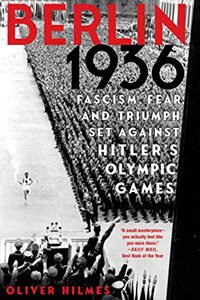Berlin 1936: Fascism, Fear, and Triumph Set Against Hitler’s Olympic Games (2016) | Book Review
 Berlin 1936: Fascism, Fear, and Triumph Set Against Hitler’s Olympic Games by Oliver Hilmes
Berlin 1936: Fascism, Fear, and Triumph Set Against Hitler’s Olympic Games by Oliver Hilmes Genres: History, Non-Fiction
Original Publication Date: 2016
Source: I purchased this book
Find the Author: Goodreads, Amazon

Berlin 1936: Fascism, Fear, and Triumph Set Against Hitler’s Olympic Games takes the reader through the sixteen days of the Olympic Games, describing events in the German capital through the eyes of a select cast of characters: Nazi leaders and foreign diplomats, sportsmen and journalists, writers and socialites, nightclub owners and jazz musicians.
Table of Contents
Berlin 1936 Olympic Games Promoted Nazi Propaganda
In 1931, Germany was awarded the 1936 Berlin Olympic Games.
In 1933, Adolph Hitler became Chancellor of Germany.
Despite ominous warnings of authoritarianism, Berlin was still allowed to host the 1936 Olympic Games.
Hitler wanted the Games to go well for propaganda purposes.
He wanted to “prove” the greatness of Germany, Aryan supremacy, and his dictatorial reign.
Although the first few years of his reign should have alarmed the world:
In terms of foreign policy, up to the summer of 1936 Hitler’s regime has been characterized by risk, political provocation, and blackmail. In mid-October 1933, Germany announced it was quitting the League of Nations and the Geneva Convention, signaling the start of a massive rearmament initiative.
By 1936 Hitler was breaking the Treaty of Versailles:
In March 1936, Hitler achieved his greatest coup to date as he sent troops into the demilitarized Rhineland.
Despite all this, Hitler was still trying to promote his supposed agenda to the world of “peace” while he was still planning to invade other countries.
The Olympics are the high point of Hitler’s massive hypocrisy. Despite the crass contempt he has displayed for agreements in the preceding months, he’s able to assume the mantle of the peace-loving statesman.
The world barely responded, and the Games were set to begin in August.
The First Truly Modern Olympics
The 1936 Olympic Games were also the first truly modern Olympic Games.
According to Wikipedia:
To outdo the 1932 Los Angeles Games, Reichsführer Adolf Hitler had a new 100,000-seat track and field stadium built, as well as six gymnasiums and other smaller arenas. The Games were the first to be televised, with radio broadcasts reaching 41 countries. Filmmaker Leni Riefenstahl was commissioned by the German Olympic Committee to film the Games for $7 million. Her film, titled Olympia, pioneered many of the techniques now common in the filming of sports.
The Festival of Nations in Olympia:
Final Analysis
This book is fascinating reading.
It brings in an interesting group of characters: not only the Nazis, but author Thomas Wolfe, a man who ran a famous Berlin restaurant, and various other people.
It takes the reader through the 16 days of the Games and explains why these Olympics were so important to the Nazis.
Further Reading and Viewing
Please read my other posts on RESISTANCE and politics:
Wall Street Journal Reporter Has Being Released From A Russian Prison
Dutch Girl: Audrey Hepburn and World War II by Robert Matzen | Book Review
State of the Blog Address 2024
Heronfield by Dorothy Balchin | Book Review
Marie: A True Story by Peter Maas | Book Review
How the Good Guys Finally Won: Notes From An Impeachment Summer by Jimmy Breslin | Book Review
All the President’s Men by Bob Woodward and Carl Bernstein | Book Review
Nickel and Dimed: On (Not) Getting By in America by Barbara Ehrenreich | Book Review
and some other book reviews:
A Tree Grows in Brooklyn by Betty Smith | Book Review
Drinking: A Love Story by Caroline Knapp | Book Review
Diary of a Mad Housewife by Sue Kaufman | Book Review
The Bell Jar by Sylvia Plath | Book Review
Cassandra at the Wedding by Dorothy Baker | Book Review
Cheaper by the Dozen by Frank B. Gilbreth, Jr. and Ernestine Gilbreth Carey | Book Review
and check out my other blog:
March For Our Lives in Morristown!
Bahrs Landing Is Still Standing in 2024
The Funky Town of Red Bank, New Jersey
Delicious Orchards 2023 | Colts Neck, New Jersey
First Presbyterian Church of Oxford at Hazen and the Spooky Graveyard 2023 | Belvidere, New Jersey
The Historic Cooper Gristmill | Chester Township, New Jersey
The Little Red Schoolhouse | Florham Park, New Jersey
Clara Barton Schoolhouse | Bordentown, New Jersey
Greystone Park Psychiatric Hospital Is About To Be Torn Down 2015 | Morris Plains, New Jersey
Thank you for reading The Literary Lioness!




